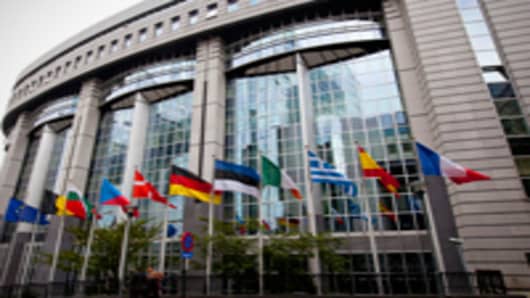Euro bonds are exactly the “wrong answer” to the current crisis and would merely lead the euro zone to a "debt union" rather than a “stability union” according to German Chancellor Angela Merkel.
The comments made over the weekend in an interview with German TV followed a meeting last week with Nicolas Sarkozy in Paris at which the euro zone’s two most powerful politicians called for member states to change their constitutions to enshrine the principal of balanced budgets while creating a euro area economic government.
The eurobond is viewed with skepticism in Germany as it would inevitably lead to higher borrowing costs for Germany while lowering the cost of servicing the debts of countries like Greece, Portugal and even Italy.
Less than 24 hours after the meeting between Merkel and Sarkozy, market sentiment took a turn for the worse, sending stocks across the world down sharply, with Germany’s DAX again leading the way lower.
One of the key drivers of that selling was the realization that Germany does not yet believe it is necessary to take decisive action to get ahead of the euro’s sovereign debt crisis. Decisive action—if the governments of Italy, Belgium and even the UK are to be believed—means a Euro bond.
Angela Merkel is not yet ready to consider that step but is, according to one analyst, laying the political foundations for such a move.
“Relative to only a year and half ago, the institutional framework of the euro area has evolved considerably. Although there is further to go, we appear closer to the end of that process than the start,” Christel Aranda-Hassel, an economist at Credit Suisse, said in a research note.
Unfortunately this process is going too slowly for markets and too quickly for the politicians and their electorates, according to Aranda-Hassel, who believes the markets are overlooking the fact that fiscal union has two aspects.
“The first—mutualization of national sovereign risk—is clearly a concern. But, by political necessity, it must evolve behind the second: the transfer of sovereignty from national governments to the federal EU level,” Aranda-Hassel said.
Merkel has gotten started on the second part of that evolution, and if she is to soften her stance on Euro bonds will need convincing that the likes of Greece, Portugal and Italy are going to take the need to balance budgets seriously.
“Chancellor Merkel and President Sarkozy’s proposals are important. They are a necessary condition for further mutualization, such as Eurobonds," said Aranda-Hassel. “But the need for that 'mutualization' is critical."
Angela Merkel cannot not yet be seen by her voters to back that view. Those hoping she will ultimately do so could have to wait for things to get worse before she can act. A lot of comparisons have been made between 2011 and 2008; one major comparison could be that in both years', action could only happen after the crisis. Remember Hank Paulson, the US Treasury Secretary in 2008, said he would never have gotten Congress to pass the Troubled Asset Relief Program (TARP) if Lehman Brothers had been saved.



